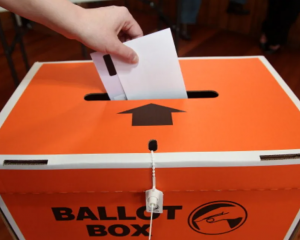
The decision by the government to ban retail surcharges for credit card and contactless transactions has been presented as a Robin Hood-style "gift" by the government to the New Zealand public that will reduce costs and increase transparency.
It will in fact do neither of these things. It will eventually both increase costs to the average New Zealander and decrease transparency, while increasing the flow of already excessive profits to large Australian banks.
The government’s move has been justified by the Commerce Commission’s recent decision to reduce the level of transaction interchange fees charged by banks to retailers for such transactions.
However, it should be noted that the outright ban on surcharges for bank merchant fees is a response to a reduction in bank interchange fees. These two bank fees are not the same thing.
As ANZ notes on its website "Merchant Fees Explained", the merchant fee consists of five components that are levied on retailers by their bank, either directly or on behalf of other parties to the transaction: The interchange fee — charged by the customer’s bank; the scheme fee — charged by Visa, or whoever’s logo is on the customer’s card; network transaction fee — charged by the eftpos network; float costs — charged by the merchant’s bank for interest before settlement; merchant bank’s acquirer margin — covers operating costs, plus a profit.
The bank interchange fee that is subject to the reduction is thus only one of five components of the fee that banks charge to merchant retailers such as cafes.
This country is dominated by four big Australian banks, which thus act as both merchant and consumer banks in almost equal measure. Consequently, one does not have to be a rocket scientist to realise that any reduction in interchange fees can rapidly be recouped by adjustment in one or more of the other components of the merchant fees, thus leaving merchant fees (and bank profits) unaltered.
It gets worse. The government has stated that merchant fees for credit cards and tap transactions are a "cost of doing business". By enacting this ban based on this reasoning they are conflating "costs of doing business" (all business costs) with overhead costs (a specific type of business cost).
An overhead is a cost that cannot be associated with any individual transaction, and thus has to be spread across all transactions. However, the merchant fee is a specific cost that can be absolutely attached to individual transactions that involve the use of credit and tap transactions rather than debit or cash.
It is thus not an overhead cost, and consequently in good business practice it can (and should) be attached to the specific transactions that incur it.
From a typical takeaway’s point of view, this makes merchant fee costs exactly like those of French fries. Burgers can be usually ordered either with or without fries. The fries are thus a specific cost that is attached to specific consumers who specifically order their burger with fries.
Consequently, and quite reasonably, the takeaway usually adds an extra charge for fries for those specific customers who choose to order them with their burger. Customers can easily avoid this charge by not ordering the fries. Fries are thus not an overhead cost.
The government ban on takeaways’ merchant fee surcharges is exactly equivalent to a government ban on charges for fries, and the related requirement that customers who choose not to order their burgers with fries should compulsorily subsidise those who do.
Most would perceive this ban and enforced cross-subsidisation to be grossly unjust if it were applied to fries abstainers.
The imposition on credit card abstainers is similarly unjust. It amounts to an active penalisation by the New Zealand government (on behalf of the Australian banks) of those customers who choose to avoid bank charges by using eftpos or cash.
And it gets even worse. In 2023 the Commerce Commission wrote an open letter to the banks about credit card surcharges.
It contained the following passage: "By facing the extra costs of their payment choices [via surcharges], consumers are well placed to make their own assessments of the available payment options, which may vary in terms of cost, speed and/or more secure options ... without surcharges consumers have strong incentives to move from lower-cost payment options to the higher-cost options, potentially leading to worse outcomes overall. This is because high-cost payment options often include consumer rewards, free credit, or greater convenience."
The banks loathe surcharges because they make the higher charges for certain types of transaction manifest to consumers — and this frustrates their efforts to promote them for commercial gain.
The finance industry makes no secret of its ambition to eliminate cash in both its tangible and electronic forms. Given that the elimination of cash would allow it to "clip the ticket" of the entire economy to the tune of 2%, this ambition is understandable.
As the Commerce Commission notes above, the perceived convenience of the more expensive payment systems is also backed up by bank-designed incentives to use them, such as Advantage/Cashback.
These incentives are actually paid for by the merchant via their higher (but now invisible) fees for these systems, and thus eventually by the community at large. If cash is eventually eliminated, and the abolition of surcharges will facilitate this, then the fees charged by banks as the new money monopolists are likely to (invisibly) balloon.
Consequently, there is no evidence that the Commerce Commission envisioned a ban on surcharges. As it notes: "Surcharges can help promote competition and efficiency in the retail payment system if done appropriately, at no more than the cost of payments. While surcharges can add costs and time to the payment experience, they also support more efficient outcomes as the costs and benefits of payment options are passed on to the consumer."
The government thus appears to be ignoring the Commerce Commission, and independently doing the bidding of the Australian banks.
It is distasteful to observe that that in the process of doing so, they are deliberately painting themselves as Robin Hood, and the struggling small business owners of this nation as the Sheriff of Nottingham — it is actually the other way around.
• Dr Robert Hamlin is a senior lecturer in marketing at the University of Otago.











